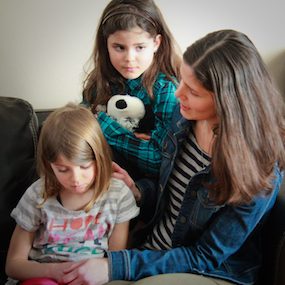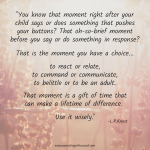It’s true- I don’t punish my children. But I usually don’t share that with others right away, because then they react with a pretty big dose of scepticism, and mild to moderate concern. Probably a bit like you’re doing now? I get it though. Everyone punishes their kids. If I don’t punish mine, what do I do?
The first assumption is that I probably let them do whatever they want without consequence. My kids would definitely be interested in that! But no.
Next is the thought that maybe we just got lucky, with two easy children? Now I’d love that one, but also no. Unfortunately, they’re just as stubborn as their parents, and they still have plenty of other things they’re working on too- just like all of us do.
So how do we manage raising them without punishment?
Most of what we do involves focusing on long-term solutions instead of quick fixes. They’re still held accountable. There are still consequences. We’ve just made fundamental changes in how we look at and address the problems our kids are having, and how we plan for the future. They essentially come down to these six areas:
Being Kind and Firm
Children need reasonable, respectful limits. If we’ve set a limit, they need to know we’ll follow through- not just sit there and keep repeating ourselves. They also need to know we’ll listen if they have concerns, and validate their feelings. There’s times I don’t want to do something either, and I appreciate when someone lets me vent about it. I understand if my kids are upset about a limit I’ve set, but I also keep the limit unless there’s special circumstances.
Building Connection
Connection is essential in our lives beyond just discipline. But we’re also more likely to listen to and do things for someone we feel connected to.
So how can we build connection? The fundamental ways apply to all people, and include spending time together doing things they enjoy, actively listening to them, offering help and encouragement if they’re having trouble, and apologizing for any hurts we’ve caused.
It’s also extra helpful if we avoid things that cause disconnection, like being distracted during our special time with them, ignoring their concerns, or shaming them for things they’ve done wrong. Basically, we build connection by treating others how we hope they’ll treat us.
Focusing on Long-term Solutions
One of the biggest shifts we’ve made is focusing on solutions instead of consequences. This doesn’t mean skipping consequences, it just means we’re also looking to address the root causes of a problem. If a child’s behaving inappropriately to gain attention, giving them an arbitrary consequence usually only works for so long. Their need for attention still needs to be met, so the behaviour may come back or worsen.
Reinforcing positive behaviours. One solution for a child who’s seeking attention in negative ways is to focus on finding any appropriate behaviours and give those lots of positive attention, which fills their need in a positive way. Additionally, behaviour that we give attention to tends to increase. If we notice our children doing something kind for us- even if it’s a very small thing- we may increase that behaviour by commenting on how much we appreciate it. It’s essential to leave it at that, though. If we add in that we’re surprised by them being good for a change, it backfires and becomes discouraging instead.
Using natural and logical consequences. All of us need to experience the consequences of our actions, within reason. Often a natural consequence presents itself, such as running out of time for a fun activity they wanted to do because they weren’t cleaning up. Then there’s nothing else we need to do besides not doing the activity. If we continuously bail them out and let them do it anyway, they learn that we’ll help them avoid consequences. And if we yell at them about it but still let them go, they learn that being yelled at is the price they have to pay to get out of cleaning up.
In other cases I may give a logical consequence, such as expecting they’ll help to replace something they’ve broken. In Positive Discipline, logical consequences are related, respectful, reasonable, and helpful. If instead I yelled at them, sent them to their rooms, and fixed it myself, they wouldn’t be learning how to fix their mistakes.
Modelling expected behaviours. We also need to model the behaviours we expect from them. If we want them to stay kind when they’re upset, complain less, keep their rooms clean, and be more present, the best thing we can do is start doing those things ourselves. And thankfully we can also model being imperfect and making amends- because none of us is that good all the time!
Teaching Social and Life Skills
Many inappropriate behaviours occur because children haven’t learned how to get their needs met in a more appropriate way. Telling them to “be nice” or “use their words” isn’t specific enough. We need to teach them concrete examples of what they can say or do, and help them practice. We also need to teach them other basic skills, like how to do chores and make their own lunches.
Encouraging a Feeling of Capability
Children need to feel like they’re capable. If we never let them experience natural consequences, problem-solve, or do chores, we’re sending an underlying message that we don’t believe they’re capable of handling those things. This can be very discouraging- and lead to them helping even less- because if someone doesn’t feel capable, they’re less likely to try. For children who are struggling with this, we can start small by asking for help with something and encouraging them to try even just a little bit- and showing how excited we are when they do.
Practicing Mindfulness
All of the other areas are key parts of Positive Discipline, so I’m including mindfulness separately. Practicing mindfulness helps provide a present-focused foundation for everything we do, from playing with our children without distraction to staying calm when they’re out of control. Learning how to be in the present moment- even if it’s uncomfortable- instead of letting ourselves get pulled into the past or future is an invaluable skill for ourselves and our children.
Putting It All Together
So I don’t punish my children. But I do teach them and help them learn self discipline. Here’s a more detailed example of how some of this might look:
“Sure, you guys can use the iPad. Do you remember how long you’ve got?” (Going back over the rules as a reminder).
Might also ask-
“What happens when the timer goes off?” and “What happens if it’s not put away?”
The time passes..
“Hey guys, five minute warning on the iPad.” (Get response from them that they heard and understand. If they’re in the middle of something that will only put them a few minutes over, this is when we can discuss adding that time on. Might also decide to join and stay with them at this point to reconnect and talk a bit about what they’re doing, which helps them ease out of it if they tend to have more trouble disconnecting.)
When the timer goes, if they didn’t put it away yet as expected, connect first before correcting-
“Wow, what are you guys working on? That looks neat.” (wait for response) “Awesome. You can do more next time- the timer went off.”
(If they start whining to keep playing) “You guys know the deal. You need to show me I can trust you to use the iPad responsibly. Your time is up, so you need to put it away now.”
(If they put it away) “Thanks so much! You’re building my trust. I’m looking forward to seeing what you work on next time.”
(If they don’t put it away) “Okay that’s too bad. We’ll have to discuss this later and you can try again in a few days.” (I take it and put it away. No nagging, yelling, I-told-you-so’s, one-last-chances, etc.)
When It “Doesn’t Work”
First off, this is a scenario of what I strive for, and it works fairly well when I actually manage to follow it. There are other times that I’m exhausted or stressed and I don’t even do half of this- and then it often doesn’t end well. But I keep adjusting and practicing because it works out better when I at least get most of it.
Even still, sometimes at first when making this change (or when there’s other issues going on) kids will resist the limits by refusing, yelling, etc. This is when it’s extra important not to back down but also not to get triggered and start yelling back or threatening (staying kind but also staying firm).
First a big deep breath, because not getting triggered can be hard.
In the iPad example, if it’s just general refusal I may calmly but firmly remind them this is breaking my trust even further and they may need to wait even longer to have time with the iPad again. They know I’ll stick to this limit, so it’s usually enough for them to reluctantly hand it over.
If instead they’re responding irrationally, I first try to validate their feelings- acknowledging that they wish they could play longer, they didn’t get to finish, etc.- before moving on to the more logical stuff.
As for the yelling itself, I usually don’t address that right away. If I find it triggering, I may excuse myself and take a few more breaths. I often suggest they take a few minutes for a break as well, and ask if they need help.
Later when we’ve all calmed down (and reconnected), we’ll talk about what happened and brainstorm ideas for what we’ll try to do differently in the future. They have a few main ways that they make amends, such as saying they’re sorry, making a card, or helping make a plan for change. For more significant or recurring hurts, that plan would include practicing self-regulation and communication skills.
We’ve also talked about how we can’t take words back, so we need to be careful what we say or people may be too hurt to accept our apology for awhile.
The main idea is to focus on these areas when responding. The specific things we say or do will vary depending on the child or situation- there’s no script that will always work, and that wouldn’t be genuine anyway.
There’s also no need to change everything all at once. Next time a challenging behaviour comes up, you might try using one of these suggestions and see if it helps. The most important thing we can do is give ourselves the same patience we’re trying to give our children, because it’s difficult to learn new skills and we’re all doing our best.








Comments